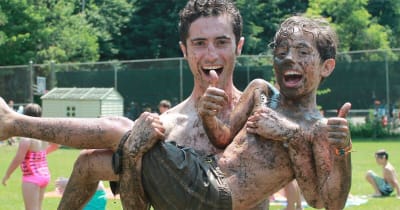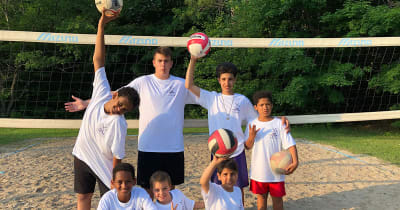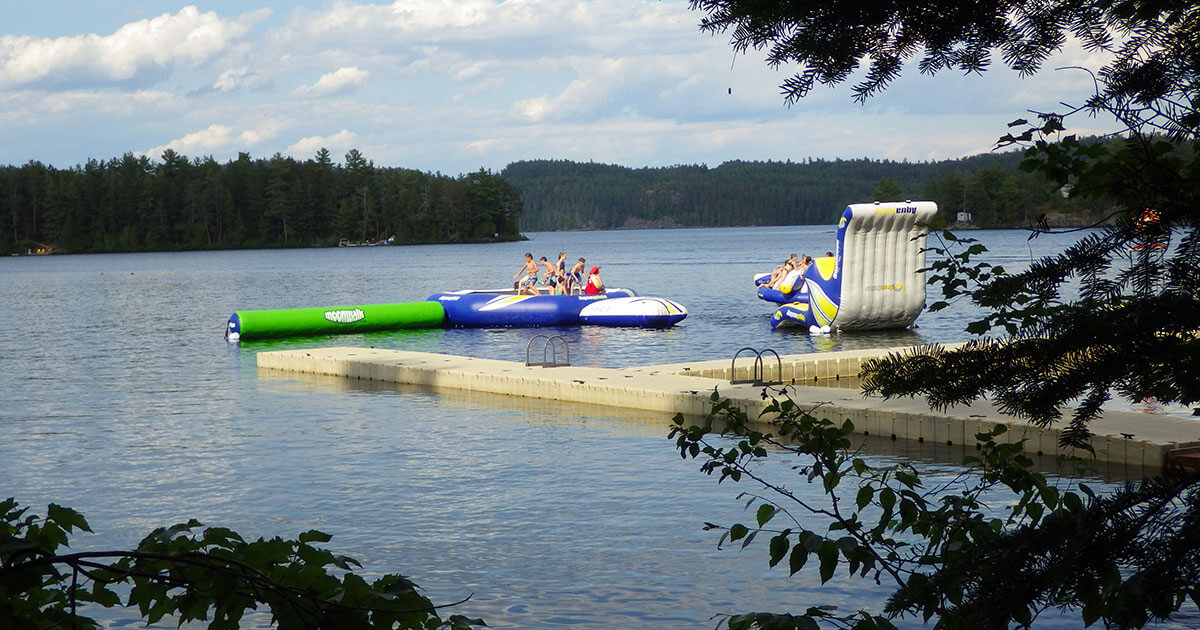“Bullying is something you always have to watch out for,” says counsellor Brendan May, but he and others know that ”creating a positive environment for kids to express themselves creatively” is the right place to start. Counsellors are also increasingly well-trained in conflict management, and camps are more attentive than ever to developing sensitivity in their staff.
Scott Graham of Camp Kahuna thinks the word “bullying” might be a bit overused, and it’s more important to understand conflict and how to navigate all disagreements. Graham is himself a renowned speaker on bullying and regularly presents talks at schools and camps. “If camps are working with an accurate definition of bullying,” he says, “they can identify it when it comes up, but they can also help kids understand all conflict in a bigger context.”
Below, we look at bullying from some different angles:
Counselor training programs and bullying prevention
Counselors are increasingly well-trained and well-versed in understanding bullying and dealing with it. “It’s not something you [just] write in a handbook or talk about once,” says Joanna Kates. “[You have to give] daily attention to kids’ relationships, in a structured and planned way.” At Camp Arowhon, this begins with an annual workshop that sensitizes staff to bullying. On the first evening of camp, she faces bullying head on by telling campers that “[they’re] all each other’s keepers, with an obligation to act in the face of bullying.”
This commitment to respect is also a core part of curriculum elsewhere. At Camp Tournesol in Mississauga, campers are asked to sign an anti-bullying contract on the first day of camp, as are all overnight campers, leadership campers and CIT candidates. The contract serves as a daily reminder of campers’ commitment to each other.
Camps also encourage counselors to take careful note of social dynamics among campers. For example, at Camp Arowhon, counsellors make a social map of each cabin. They diagram who is “in” and who’s being left out. Campers also fill out a questionnaire that asks, among other things, if they feel unsafe.
As a core part of anti-bullying messaging, camps emphasize that standing by during bullying is not an option. “[Everyone] has an obligation to act in the face of bullying,” says Kates. “I teach them that bystanders can stop bullying [when] they side with the victim, or even just report the incident to a counsellor.” When someone reports bullying, trained leaders avoid exacerbating the confrontation, focusing on supporting the speaker telling their story.
Graham also emphasizes the importance of knowing when to be an upstander instead of a bystander. “It’s important to tell,” he says. “Kids need to know the importance of standing together.” At Camp Kahuna, they “roleplay scenarios and specific stories,” he says. “Maybe it’s the scenario of a ringleader who says things to make other kids feel left out, or maybe it’s a scenario of a kid who says teasing things then makes light of it. When you play out those scenarios the kids figure out basic strategies of what to say and what to do.”
In a York University study, PhD student Catherine Cappadocia reported that “80 percent of campers reported standing up for a victimized peer the last time they witnessed bullying. This is a [much higher] rate of intervention, as compared to observational studies conducted on school playgrounds [and other settings which typically] found that 17 to 25 percent of peers intervened during a bullying episode.” This rate is much higher in camps, especially those with dedicated bullying prevention programs. Camps like those above take joy in preventing and dealing with bullying in a positive, proactive way.
Peer mediation
Camp leaders and counselors are specifically trained to deal with conflict resolution, and many overnight camps can offer anecdotes about the effectiveness of specific techniques for dealing with bullying. For example, peer mediation is one effective measure. Adam Springer of Camp Couchiching tells of an incident where training, combined with years of experience as a camper and counsellor, helped him defuse a bullying situation.
"When it comes to dealing with problems in the cabin, I often think back to my own days as a camper," he says. "My counsellors did a great job dealing with my behaviour [challenges], while keeping me happy." As a counselor, Springer found himself addressing a confrontation between two senior campers.
"I pulled them both [aside] and took them to a sports field where we could sit quietly. I took out a roll of cookies, sat the boys down and encouraged them to talk." The shared cookies served as a distraction, and the boys calmed down and started to talk about how each of them felt during their conflict. "By the end of it, they were both aware of [the other’s perspective] and realized that verbalizing their feelings felt so much better."
Basic advice for parents and kids
Talk about bullying with your kids. Make sure they know they can trust you with embarrassing problems like this. Sometimes kids who are being bullied feel shame, and believe it’s their fault. Ensure that your child understands the bully is the one who needs to change their behaviour.
Make sure your child knows how to speak up. Children need to know they can talk to someone, whether that’s a teacher, parent, older friend or relative. Parents should ensure that their children know who to turn to and understand the importance of speaking up. Graham calls out “tattletale syndrome,” in which “kids are afraid of being labeled a ‘snitch’ or a ‘tattletale.’” They need to understand the value of being assertive, as he says, “telling with the purpose of getting someone out of trouble. By telling, you may even help the bully realize that their behavior is inappropriate and steer them onto the right road.”
Rehearse scenarios. Parents can encourage their children to take a stand thorough role-playing scenarios. You can brainstorm strategies for keeping their cool in a bullying situation. “Bullies are often looking for a reaction,” says Brouillard. “When a bullied kid or teen learns how to avoid getting upset, crying or looking angry, the bully will typically get bored and stop.”
Encourage them to record or write down negative behaviours. If kids are bullied or witness bullying, they should objectively write down what bullies have done or said.
If your child has a strong personality, and is well-liked, it’s even more important to encourage them to identify bullying and take a stand against it. Children who have influence with others can help grow a bully-free environment by calling out bullying behaviour.
Get more advice from bullyingcanada.ca and prevnet.ca.
Girls and boys bully in unique ways
Tanya Beran from the University of Calgary has unique research into the differences. "As a general group, boys spend more time with boys in physical activities such as sports and games; girls tend to spend more of their time socializing with other girls in more friendship-based activities (e.g., talking with other girls). So it is no surprise that boys and girls tend to bully and be bullied differently."
Girls will say and do things that make others feel alienated and alone. Being singled out in a cabin group, ridiculed by peers, excluded from social activities, or alienated from the group are all forms of bullying and very hurtful for the victim. Being beaten up emotionally on a daily basis does long term damage to a person.
How all-girls camps can uniquely deal with bullying
Girls and boys bully in unique ways. Tanya Beran from the University of Calgary has unique research into the differences. "As a general group, boys spend more time with boys in physical activities such as sports and games; girls tend to spend more of their time socializing with other girls in more friendship-based activities (e.g., talking with other girls). So it is no surprise that boys and girls tend to bully and be bullied differently."
An all girls experience allows the camp the opportunity to provide intervention and a proactive learning focus with a gender difference approach. The all female environment gives girls a unique opportunity to make strong connections with other girls at camp and to identify with female staff leaders. An all girls camp allows girls to feel more comfortable and more willing to take risks and thus gain confidence in themselves. The resulting enhancement of self- esteem is highly connected to positive relationships in which bullying is not acceptable. Self confident girls proactively deal with situations that are not comfortable or acceptable. Fostering sensitivity to the feelings of others can go a long way to stop bullying and aggressive behavior before it starts.
Most girls camps offer programs which proactively deal with the unique behaviours exhibited by girls. For example, the Girls Circle program at Camp Tanamakoon has been successfully running for many years now. Girls participate weekly in a variety of themed discussions and activities that are facilitated by camp leaders. These programs identify and target behaviours such as female bullying and self-esteem and actively help girls grow through experiences and activities.
The gender of the staff dealing with programs of this nature is key to its success. Girls will relate best to strong and assertive female leaders who have had similar experiences while growing up. As Chris Thurber, author of the Summer Camp Handbook writes: “At a single-sex camp, girls can not only be themselves, they can be their whole selves and reenter the coed world with renewed confidence and empathy.”







